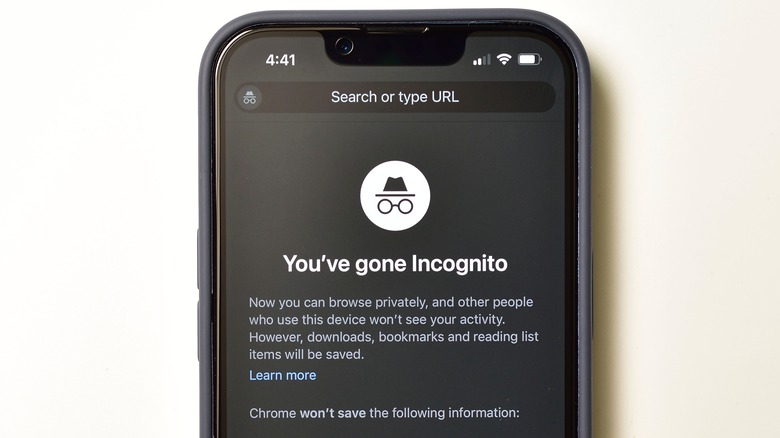Chrome's Incognito Mode Is The Butt Of Jokes Among Google Employees, It Seems
Despite Google's touting of the incognito mode feature available on its Chrome web browser, the feature is allegedly something of a joke to the company's own engineers. According to a report from Bloomberg, Google engineers were making fun of incognito mode as far back as 2018, and the reason seemingly boils down to the iconography — or, more specifically, the way it does a poor job of conveying the level of privacy incognito mode actually affords.
In a chat shared by Bloomberg, one Google engineer reportedly stated that the company needed to change both the spy guy icon and the incognito name because they were giving users the wrong impression. At the heart of the matter is a problem involving consumers who don't have a solid grasp of the technology, ones who may see the incognito name and icon and believe their browsing is far more protected and private than it actually is. Another employee reportedly responded with an image of the Homer Simpson lookalike Guy Incognito, stating that the icon should look more like the Simpsons character because it "... accurately conveys the level of privacy" incognito mode provides.
Why Chrome's incognito mode isn't all that neato
When you use Chrome's incognito mode, you're preventing the browser from saving your browsing history and other private data, as well as preventing Chrome from recording your browsing session. In other words, it's more private than if you were to use Chrome without it turned on, and can be used to, for example, make it harder for roommates to snoop on your browsing activity on a shared computer.
Incognito mode doesn't anything else, though; it won't mask your IP address, location, or other potentially identifying data. It's not a VPN, and instead, its primary purpose is to hide your activity on a small, entirely local scale. Even then, while incognito mode won't keep track of your history, it will still keep a record of any bookmarks you've made and everything you've downloaded.
The text communications surfaced as part of a lawsuit aiming for class action status against Google over claims that the company harvested users' data even when they used incognito mode — and, more to the point, that the company had allegedly misled those users into believing their information was being protected. For its part, a Google spokesperson said in a statement to Bloomberg that regarding incognito mode, the company has been "clear about how it works and what it does."

